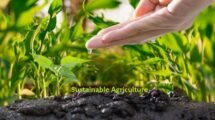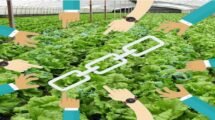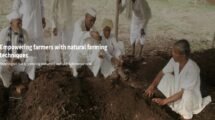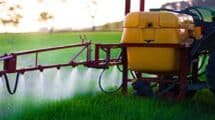Farmers live with risk and make daily decisions that affect their livelihoods
Farmers live with risk and make daily decisions that affect their farms and livelihoods. Most of the decisions that farmers make cannot be predicted cent percent accuracy. The changing weather, changes in the price of outputs at marketing, unavailability of labor at peak times; machinery and equipment that could break down when most needed; climate shocks like droughts where crops are damaged and animals even die; and also changing government policies and schemes make the farmers’ livelihoods risky.
The major risk types faced by the farming community are:
Production risk:
The quality and quantity of commodities produced are affected by various factors like weather, disease, pests, improper management practices, a lack of proper technology, and other factors. They do not know there will be a problem with pests and diseases, but still, crops or livestock are raised. The resources they spend to plough, plant, and fertilizer are a burden on the farmers until they get a good harvest at and reasonable price.
Price or market risk:
It refers to uncertainty about the prices producers will receive for commodities or the price risk varies significantly from commodity to commodity. The prices of farm products are affected by the supply of a product, the demand of the product and the cost of production.
Financial risk:
Financial risk occurs when money is borrowed to finance the farm operations and smallholder farmers who borrow money at high-interest rates and few lenders in the market may have difficulty making debt repayments when lower than expected prices combined with low yields affect them. A higher risk of crop failure also discourages lenders from providing credit to rain-fed agriculture This leads to distress sales and sometimes is the reason for the loss of their property as well as lives.
Institutional risk:
It refers to uncertainty in changes in the requirement of services, risk can be both formal and informal and includes banks, cooperatives, marketing and government policies and lack of proper and timely extension services.
Personal risk: It refers to factors such as farmers’ health that also affect the farm business, illness and death. Migration of labourers away from their rural areas is a common thing. Rural migration seasonal or permanent affects the labour availability in agriculture.
Climatic risk:
Climate change has now emerged as a potent threat to sustainable agriculture, food security and livelihood of farmers in developing countries like India. Climate change can affect agriculture in a variety of ways. Beyond a certain range of temperature, warming tends to reduce yields. Low rainfall or drought also may lead to low yield. Hailstorms, floods and heatwaves damage the crops and livestock. When farmers sow the seeds and fertilize their land expecting good returns, the weather plays the role of their destiny.
Also Read: SC’s decision to provide crop loss compensation for farmers is a huge relief
Risk in rainfed agriculture:
Rainfed agriculture is more vulnerable and affected by persistent weather fluctuations and water scarcity. The incidence of drought measured in terms of severe drought, is high in districts of Rajasthan, Tamil Nadu, Maharashtra, Karnataka and the major rainfed states of the country. A dissection of risk points out some basic factors- poor capacity of soils in terms of nutrients, organic matter, water holding capacity and low availability of water. The rain-fed crops such as cereals, pulses, and oilseeds face higher price risk compared to irrigated crops such as rice, wheat, and sugarcane.
Hence, climatic and other forms of risk remain a key challenge to researchers and policymakers. Temperatures also interfere with the ability of plants to get and use moisture. Decision-making is the major activity of management. All decisions have different outcomes however, in many situations, the outcome of a decision cannot be predicted. Farmers need to know about the risks and have risk management skills to better understand the problems and reduce the effects.
The problems faced by farmers have many options for reducing the risks, mostly by using a combination of plans and diversification. Some plans deal with only one kind of risk, while others have many risks. Enterprise changes predict incomes from different crops and livestock activities do not move up and down in perfect mutual relationship so that low income from some activities would likely be balanced by higher income from others. The risks are also connected with the quantity and quality of both the inputs and outputs of the farm.
Also Read: Commission Reco and Policy Attention to Improving Farmers’ Income
Crop insurance is the mechanism to protect farmers against uncertainties of crop protection due to natural factors beyond the control of farmers. When the yield decreases below its insured level of crop yield it pays insurance to producers. Coverage may be provided through private hail insurance or govt subsidized multiple peril crop insurance. Crop disaster payments are also helping farmers. In this, payments are made directly to farmers on an emergency basis when crop yields are abnormally low due to adverse growing conditions.
Those agricultural risks have different sources but nevertheless, they are also related to each other and a greater awareness of the multi-risks and research focus could help in risk prioritisation and management.
Authors: Lakavath Soniya1, Josily Samuel2 and Pushpanjali2 and Ajay Anto Soy3, RAWE student (CRIDA), ITMU1, Scientist, CRIDA2, and M.Sc. research scholar PJTSAU3



















Add Comment